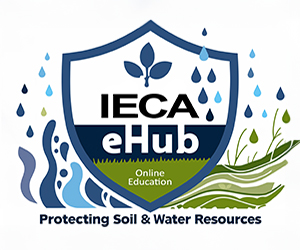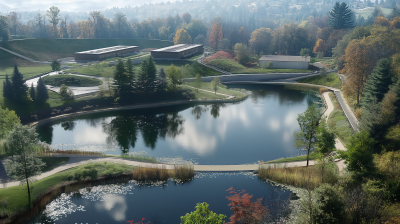
Design Fundamentals of Erosion & Sediment Control Measures for Construction Activities
-
Register
- Non member - $225
- Professional member - $200
- Professional Plus member - $200
- Professional Plus Org member - $200
- Student member - $200
- Young Professional member - $200
- Emeritus member - $200
- Discounted Professional member - $200
- Australia Member - $200
- Australia Non-Member - $225
- Australasia Professional Plus - $200
Design Fundamentals of Erosion & Sediment Control Measures for Construction Activities

Presented by: Michael Perez. Ph.D., Assistant Professor | Auburn University, Wesley Zech, Ph.D., LEED AP, Professor | University of Alabama Birmingham and Wesley Donald, Ph.D., Research Fellow | Auburn University
Level: Intermediate
Duration: 6 hours
Type of Course: On-Demand
This online course is a comprehensive overview of the rules and regulations that govern construction projects regarding stormwater pollution prevention, the erosion and sediment processes, design of control practices, and technology applications for the construction industry. The course is intended for participants generally familiar with erosion and sediment control concepts who want to increase their knowledge level within the construction industry to advance their professional careers. Six modules make up the entire course, which include review questions at the conclusion of each module intended to reinforce presented material.
The learning objectives for this online course are:
- Gain an understanding of federal erosion and sediment control regulations and how they apply to state and local municipalities that establish expectations of site operators in the erosion and sediment control industry;
- Provide a review of typical erosion and sediment control practices and learn effective site planning, installation, and inspection strategies; and
- Attain an overview of hydrological analysis and soil loss models, and learn site assessment strategies for developing stormwater pollution prevention plans (SWPPPs).
Participants of this course are expected to obtain an in-depth overview of erosion and sediment control regulations and design applications. Modules Include:
Module 1: Rules and Regulations, provides an overview of federal stormwater regulations and how they apply to state and local municipalities, which establish the expectations of site operators in the construction industry. Course participants will: (1) leave with an increase in awareness on the issues of stormwater pollution generated from construction activities and the negative impact it has on the environment; (2) gain an understanding of federal regulations as it pertains to stormwater runoff from construction sites; and (3) understand requirements associated with conducting construction site inspections of erosion and sediment control practices.
Module 2: Erosion Control, describes the process of erosion, primary causes, and various strategies to control erosion on construction sites. Course participants will: (1) gain an understanding of the erosion process and the primary influencing factors, (2) understand the purpose of erosion controls and their ability to protect the soil to promote the growth of vegetation; (3) become knowledgeable on typical erosion control practices used in construction; and (4) understand effective site planning strategies to prevent or minimize erosion.
Module 3: Sediment Control, covers the process of sediment transport and deposition and various strategies to control sediment transport on construction sites. Course participants will: (1) gain an understanding of the sedimentation process and the influencing factors; (2) become knowledgeable on typical sediment control practices used in construction and their limitations; and (3) understand the installation and maintenance requirements of typical sediment control practices.
Module 4: Managing Runoff, provides provides an overview of the various aspects of site hydrology and various design principles to quantify stormwater runoff based upon site specific characteristics. Course participants will: (1) have the ability to understand modeling hydrologic principles and understand how it relates to erosion and sediment control applications; (2) attain an overview of hydrological analysis techniques and resources for required data and input; and (3) be able to apply various hydrological models to a construction site to determine runoff characteristics.
Module 5: Soil Loss Modeling: this module covers various soil loss models used to quantify the effectiveness of various erosion and sediment control practices and corresponding sediment yields. Course participants will: (1) gain an understanding of various soil loss data models and applications; (2) have the ability to determine site-specific factors that are required by soil loss models; and (3) be able to apply various soil loss models to calculate sediment yield for a construction site.
Module 6: Site Planning and Management: this module will cover site assessment strategies and runoff control measures for developing effective stormwater pollution prevention plans (SWPPPs) used during construction. Course participants will: (1) become knowledgeable on effective erosion, sediment, and pollution prevention control strategies typically employed in construction; (2) understand key pollution prevention and housekeeping practices typically used to ensure the construction site and materials do not contaminate stormwater runoff; and (3) attain an understanding of site planning strategies that could be implemented to minimize erosion potential, sediment transport, and pollution discharge from construction sites.
Course Level: All
Course Reviewed: June 2024
Michael Perez, Ph.D.
Dr. Michael Perez is an Assistant Professor in the Department of Civil Engineering at Auburn University. He has been working in the stormwater management area since 2012 through research and consulting projects with the Alabama, Georgia, Iowa, Minnesota, Nebraska, North Carolina, and Ohio DOTs. His expertise is in large-scale performance based testing, having designed and conducted experiments evaluating storm drain inlet protection, ditch checks, sediment basins, sediment barriers, rolled erosion control products, and surface skimmers at the Auburn University - Erosion and Sediment Control Testing Facility. In addition, he has developed post-construction stormwater management design guidance and tools for the Georgia and Nebraska DOTs. Dr. Perez has published over 20 journal articles and conference papers and has delivered dozens of technology transfer and continuing education seminars in the construction and post-construction stormwater management field. He currently serves as the chair of the standards and practices committee for the International Erosion Control Association. He is also a Certified Professional in Erosion and Sediment Control (CPESC) and is an Iowa Certified SWPPP Designer and Inspector.
Wesley Zech, Ph.D., LEED AP
Professor, Interim Chair, & Director of Construction Engineering Management University of Alabama Birmingham
University of Alabama Birmingham
Dr. Wesley Zech is currently a Professor and Interim Chair in the Department of Civil, Construction, and Environmental Engineering and also serves as the Director of Civil Engineering Construction Management. Prior to his appointment with the University of Alabama Birmingham, he was the Brasfield and Gorrie Professor of Construction Engineering and Management at Auburn University. He earned a B.S. (1999), M.E. (2000), and a Ph.D. (2004) from the University at Buffalo in Western, NY. He was employed at Auburn University since 2004 and has conducted external research in collaboration with the Alabama Department of Transportation (ALDOT) that led to the development of the Auburn University Stormwater Research Facility. His research has focused on the evaluation of silt fence tieback practices, the use of polyacrylamide as an erosion and sediment control measure, the performance evaluation of various hydromulches, performance evaluation of various ditch checks and inlet protection measures, assessing the in-field performance characteristics of sediment basins constructed in Alabama, and characterizing post construction runoff control from construction. Many of the research results from these efforts have been adopted as standard erosion and sediment control practices used on highway construction projects in the state of Alabama.
Wesley Donald, Ph.D.
Research Fellow
Auburn University
Dr. Wesley Donald is currently a Research Fellow in the Department of Civil and Environmental Engineering at Auburn University. Dr. Donald received his Bachelor, Master, and Doctoral degrees in Civil Engineering from Auburn University. The focus of his doctoral research was on the use of ditch check practices in channelized flow for controlling erosion on highway construction sites. Dr. Donald has performed research in ditch check practices; has researched sediment barriers in sheet flow applications for evaluating ALDOT sediment barrier practices; has evaluated catch basin inserts for urban runoff applications; and has assisted in the testing of inlet protection practices. Currently Dr. Donald is overseeing the testing of erosion control products under simulated rainfall conditions, vegetated buffer equivalents for sediment barrier practices, using UAVs for vegetation density measurements, using flocculants to enhance and improve sediment control devices in construction, and optimizing sediment basin performance for limited right of way projects. Dr. Donald also provides training in erosion and sediment control technologies to industry practitioners; and is instructing undergraduate and graduate students in courses related to Civil, Environmental, and Construction Engineering.



